Teaching English in Korea has become increasingly popular over the years.
It’s an amazing way to experience a new country whilst still earning a great salary to support yourself.
A few years ago, I quit my corporate job in South Africa to become an English teacher in Korea. It was a decision I didn’t take lightly.
I was scared.
I’d heard so many horror stories but looking back, moving to Korea to teach English was the best decision I’ve ever made. I fell in love with the country, and it paved the way for years of travel!
So, you want to teach English in Korea, but you’re not sure where to start?
This guide details everything you need to know about getting a job at either a public or private school, teaching requirements, where you should teach, the expected salary for teaching English in Korea (and so much more!)
It’s quite a long read, but this is your go-to guide to teach in Korea, updated for 2024!

Quick Navigation
Teaching English in Korea requirements
If you’re planning on moving to Korea to be an English teacher, you will need to apply for an E2 visa.
To qualify for this visa, there are certain teaching English in Korea requirements that you need to meet. These are non-negotiable.
- Citizenship from an English-speaking country. These countries include South Africa, Canada, USA, Ireland, UK, Australia, and New Zealand.
- Bachelor’s degree from an English speaking University/College (You can’t teach English in Korea without a degree)
- Clear criminal record (you will need to do a criminal background check)
- Pass a health test which includes a drug and HIV test
- Hold a TEFL certification (a recommendation, not a requirement)

English Teacher in Korea salary
The most common question I get asked is how much do English teachers make in Korea.
And while it’s good to know the actual amount, also bear in mind that there are other perks that increase the value of being an English teacher.
The salary for English teachers in Korea starts at 2.1 million Korean Won ($1 500) per month and can go up to 2.8 million Korean Won ($2 200).
This salary will differ depending on whether you teach at a public or private school (more on that later).
This amount is highly dependent on your teaching experience.
But if luck is on your side, you may get a better offer without necessarily having any experience on your CV.
Unfortunately, work experience in other fields not related to teaching doesn’t count. And so you’ll have to start at the bottom as I did.
Income tax in Korea ranges from 2.5% – 5%, and this is deducted from your monthly salary.
Therefore, the minimum monthly salary after tax is 2 030 700 Korean Won ($1 700).
How much can you save on an English teacher salary in Korea
But wait, there’s more. You’ll most likely earn more than this if you teach English in Korea.
Severance pay: Upon completion of a 12-month contract, you receive a bonus which is equivalent to 1 month’s salary.
Overtime: Overtime is paid when you are asked to work more than 120 teaching hours a month. This is the industry norm, so if you do any additional work, you will be compensated for it.
Private tutoring: This can be risky as it’s technically illegal for foreign teachers (on an E2-sponsored visa) to teach private classes outside of their normal classes. Yes, you can get deported! But many people do it, and they earn great cash.

Benefits of teaching in Korea
Being an English teacher in Korea has additional perks which increase the value of your teaching package.
Free airfare: Your school will cover the costs of your plane ticket to Korea. Sometimes they’ll even offer to pay for your return flight back home upon completion of your contract.
Free housing: Teachers in Korea can expect to receive a semi-furnished apartment within walking distance from their school. I had to quickly adapt to my small apartment (especially the bathroom situation). But like everything in life, you need to embrace cultural differences and be open to change. And, it’s free, of course, so who’s complaining?
Some schools may even offer to increase your salary in lieu of an apartment, but this is not the norm.
Medical insurance: By law, all Korean schools have to cover 50% of foreign teachers’ medical insurance. The balance is deducted from your salary. This amount is minimal and ranges from 1.5%-2.5% of your total income.
Luckily for me, my school covered my medical insurance in full, so I didn’t have to contribute to this.
School lunches: Not all schools provide lunch for their staff, but mine did. It may not always taste as good as it looks. But it’s free, and if I can stomach it, I’ll eat it!
Pension fund: A portion of your monthly salary will go towards your pension fund. Your school will match this amount, and you will receive this lump sum upon completion of your contract.
However, South Africans teaching English in South Korea are exempt from making pension fund payments.
No need for a car: which means no monthly car payments, no car insurance, and no fuel costs. The public transportation system in Korea is incredible. It makes life so much easier and cheaper.
Coming from South Africa, where we don’t have the luxury of fast and efficient public transport, I can appreciate this one benefit of living in a first-world country.
READ MORE: MOVING TO KOREA? HERE’S WHAT TO PACK
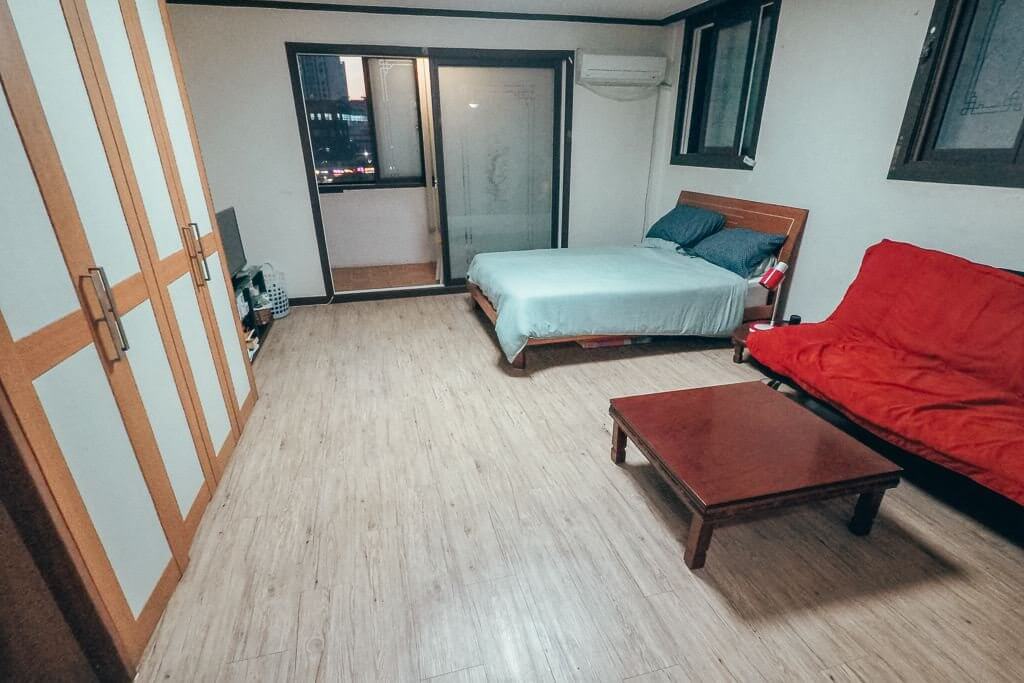
Public Schools vs Private Academies (Hagwons) in Korea
Teaching English in Korea allows for a choice of 2 types of schooling environments which often leads to the debate: Private schools (Hagwons) and public schools.
Teaching at a Hagwon (Private Academy) in Korea
Hagwons are private language academies that students attend AFTER their regular classes at a public school.
These are extra classes that parents send their children to. As such, Hagwons operate as businesses more so than schools.
Teachers at Hagwons often work evening schedules and the hours can be long.
What’s it like to teach in Korea at a Hagwon
Working at an afterschool academy (hagwon) means that your students would have already spent 6 hours at their public schools before attending your class.
On top of this, they may have math, science, art, or music academies that same day.
They will be tired, stressed, and unmotivated.
As their English teacher, it’s your task to encourage these students because they need to get top grades.
And by top grades, I mean 90% and higher.
Students compete for first place, and the pressure these children face is unreal.
The parents expect a lot from Hagwons as well. So as the ESL teacher, you’re under a lot of pressure to ensure their kids excel in English (or make it seem that way).
Note: I taught at a private academy (Hagwon) in Korea. Yes, there are Hagwon horror stories, but each academy is different. I loved my school, and whilst the director was extremely hard-working, she was kind and caring and looked out for me.
Public Schools in Korea
Teaching English in South Korea at a public school offers a great working environment for teachers. It’s often preferred over a private hagwon.
But there are a few cons that you need to take into consideration.
As a result, I chose to teach at a Hagwon over a public school in Korea.

Public School vs Hagwons in Korea: The Pros & Cons
Below is an extensive list of considerations when deciding between teaching at a public school or hagwon Korea.
| Public Schools | Hagwon (Private) | |
| Recruitment | Twice a year (March & September) | Year-round |
| Management | Government run | Operate like a business |
| Location | Lottery. You get placed where there’s a demand. | Lots of jobs, so you choose a location |
| Salary | 1.8 – 2 million KRW (first-time teachers) 2.1 – 2.8 million KRW (experienced teachers) | 2.1 million KRW (first-time teachers) 2.2 – 3 million KRW (experienced) |
| Annual leave | 18 days | 10 days |
| Class sizes | 20 – 35 students | 1 – 15 students |
| Other ESL teachers | 1 ESL teacher | 2 – 15 ESL teachers |
| Working hours | 8 am to 5 pm | 1 pm to 10 pm |
| Couples | Difficult to get placed in the same school | Easy to get placed at same school |
1. English teacher recruitment
There is a high demand for foreign English teachers at hagwons (private schools). As a result, hagwons hire teachers all year round.
The job market is less competitive for these hagwons as there are so many. It’s easy to get a job as an English teacher starting at a date that suits you best.
Ideally, you should start speaking to recruiters 3 months before you intend on arriving in the country to ensure that you have sufficient time to arrange your visa.
In contrast, public schools have a teacher intake for the start of each semester, which includes February/March and August/September.
The process for getting into public school is rigid, and the competition is strong.
When applying to a public school program in Korea, it’s best to start the application process up to 6-months before the start of the semester.
If you are looking at teaching English in Korea and are not available for the February or September intake at public schools, you would need to look at applying at a hagwon instead.
2. School operations and management
When it comes to working at a hagwon in Korea, each academy is different.
Being a private business, they are not regulated. The director manages the school as he or she feels best.
As a result of this, you never really know what you’re getting yourself into until you get there.
I’ve heard horror stories of many foreigners complaining about being overworked without compensation, issues with severance pay, being fired without notice, and problems with their apartment.
I’ve never faced any of these issues. You often hear more of the bad than the good.
In contrast, public school systems have programs run by the Korean government which allows for a more structured working environment.
There is more consistency with regard to working hours and pay.
Generally, public schools don’t take the chances that hagwons do, and so it is the safer option.
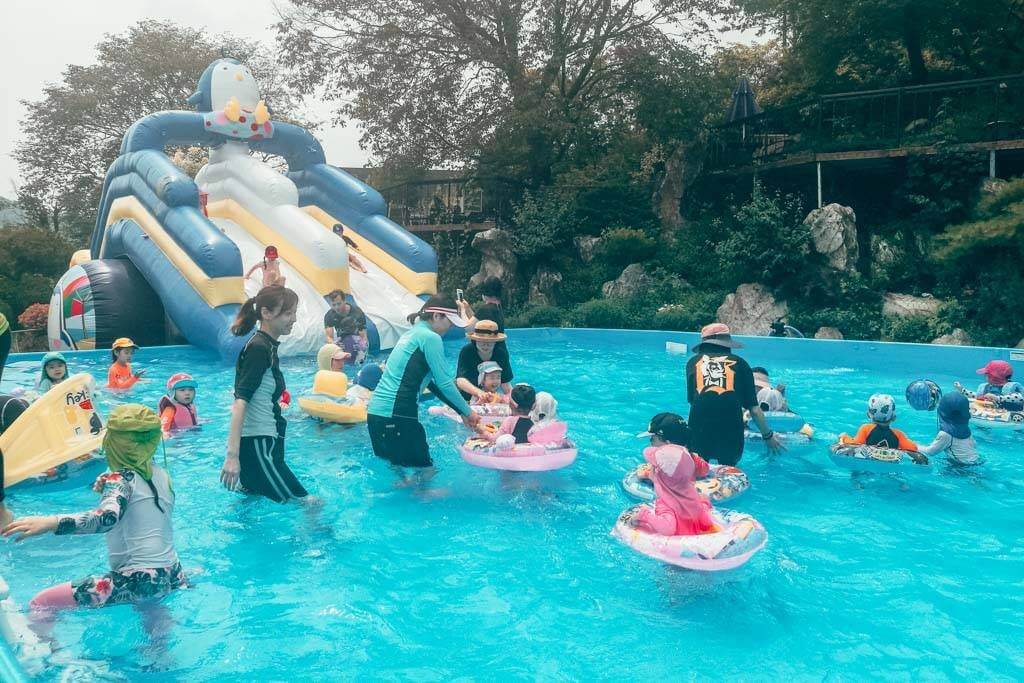
3. Location of your school within Korea
Hagwons, offer more flexibility when it comes to choosing where you want to teach English in South Korea.
You apply for the job knowing where the school is located.
Do you want to live in a big, busy city like Seoul or a smaller one with a tight-knit community?
This is one of the biggest pro’s of working at a hagwon.
When applying for public school placements, you sign up for a program (which I’ve listed below).
Here, you can select your top 3 cities where you would like to be placed.
However, this is a lottery, and when teaching at a public school, you could end up anywhere in the country based on where there’s a demand.
4. Salary for teaching English in Korea
The salary for English teachers in Korea at both hagwons and public schools are fairly similar, starting at around 2.1 million KRW ($1 500) per month.
However, when it comes to hagwons, your pay is not determined on a national scale (as it is at public schools). The director decides your salary.
Therefore, you are more likely to find a hagwon that will pay slightly more if they really feel that you’re a great candidate.
Both hagwons and public schools offer additional benefits and a similar package which includes flights, housing, medical aid, and pension.
However, public schools include a settlement allowance of around 300 000 KRW ($250) to help with your move to Korea, over and above all the other benefits.
This is something not offered by Hagwons.
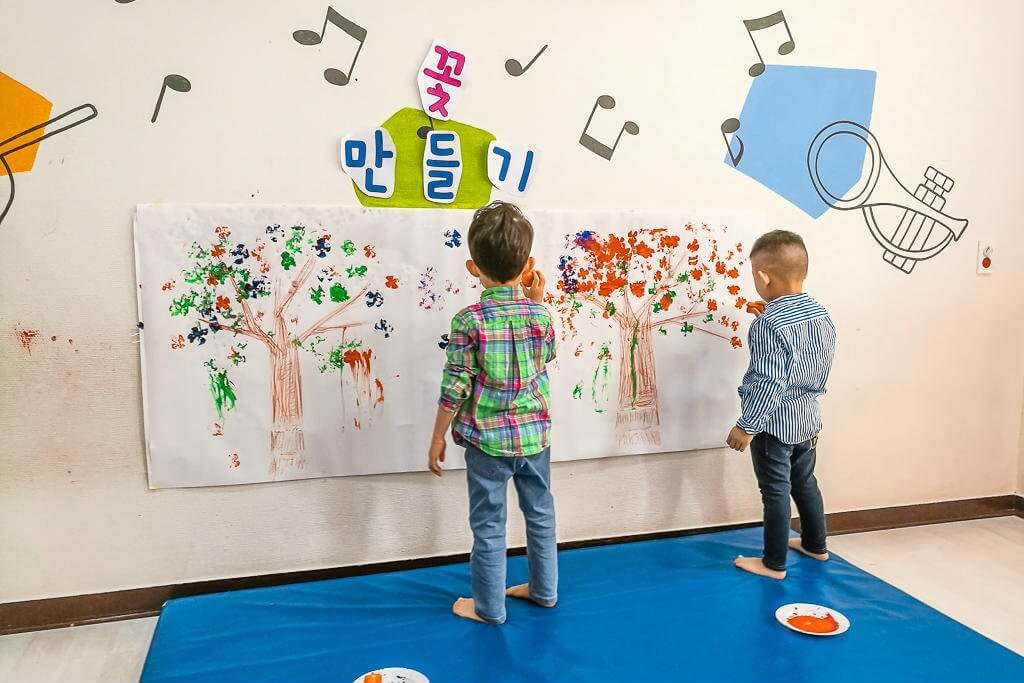
5. Annual leave for English teachers in South Korea
As an English teacher at a hagwon (private school), you’re allocated 10 days of paid leave per year.
Why only 10 days?
Well, even if students are on public school vacation, they still attend all their extra private classes.
Their parents may even sign them up for additional classes to keep them busy during the holidays.
5 of these leave days are in Summer, and 5 are in Winter.
These days are set by the school, and you cannot choose when you want to take your vacation.
This is one of the biggest con’s of working at a hagwon in Korea. Trust me, working that hard for such a few leave days is brutal!
In contrast, one of the main perks of working at a public school is the number of vacation days given to foreign teachers.
Public schools in Korea offer 18 days of paid vacation per year.
This means that as an English teacher at a public school, you’ll probably get to explore more of South Korea.
Public holidays and sick leave
In addition to annual leave, teachers at both public and private schools also get public holidays off.
But, there are cases where teachers have had to make up these hours lost by working on Saturdays. This is something to ask before signing your contract.
And sick leave? Well firstly, Koreans rarely take sick leave. If you have a slight cough, you work!
Private academies allow 3 days of sick leave per year, while public schools offer around 11.
Be sure to confirm all details pertaining to paid leave before you sign your contract, as this can vary slightly depending on the academy.

6. Class size
Hagwons in South Korea consists of smaller classes of 1 to 12 students, with no Korean co-teacher present during the class.
Public schools have much bigger classes of 20 to 35 students. However, there is always a Korean co-teacher present in class to help manage the students.
7. English teachers at your school
If you teach English at a hagwon in South Korea, there may be other foreign teachers at your academy.
Generally, there are 2 to 6 ELS teachers, depending on the size of the school.
If you work at a public school, you will most likely be the only foreign teacher.
8. Working hours when teaching in Korea
Working hours at Hagwons are usually 1 pm – 9 pm.
This will be quite the adjustment to your normal schedule, as you only need to be at work by noon!
Your total teaching time will be no more than 30 hours per week, but your director will ensure you teach most of these hours as they need to maximize their business profits.
When you’re not teaching, you’ll be marking tests and assignments and assisting with lesson plans.
If you’re lucky, your hagwon may serve as kindergartens during the morning and switch over to elementary/middle/high school students in the afternoon.
Because of this, there is a chance you can work normal hours (9 am – 6 pm) if you come across a kindergarten/elementary hagwon.
On the other hand, public school hours operate from 8:30 am – 4:30 pm.
When working at a public school in Korea, your actual teaching hours will be less than that of teachers at Hagwons.
However, you would still need to physically be on the premises, even if you aren’t teaching.
This is a term commonly referred to by most foreigners as “desk-warming”.
9. Teaching English in Korea as a couple
Many hagwons in Korea offer couples teaching positions where you’re placed at the same school as your partner.
You also receive a larger apartment suitable for 2 people, and you’ll work the same hours.
However, couple teaching positions are hard to come by at public schools as most only have 1 foreign teacher.
As a result, you may end up in a completely different city from your partner.
However, there are exceptions if you are married.
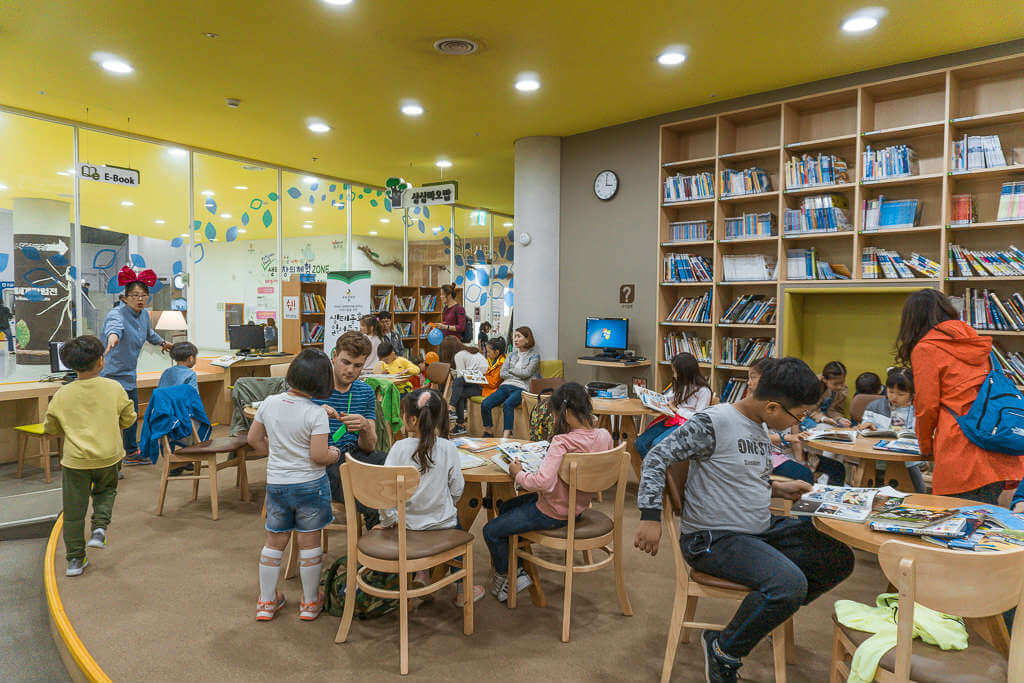
10. Level of students’ English
Hagwons place Korean students into classes based on their English level (and not their age group).
The classes are, therefore easier to manage as everyone is more or less on the same standard.
Classes at public schools, however, consist of students of the same age with varying levels of English.
Some of these students attend a hagwon after school so their English is stronger, while others would never have attended additional classes.
Trying to find a balance between the students may be tricky at first, especially when you’re teaching English to a class of over 20 students.
Public School English Teaching Programs in Korea
There are various public school teaching programs in South Korea that you can apply for. Here are the most popular
SMOE (Seoul Metropolitan Office of Education)
This program recruits for over 2000 public schools within the city of Seoul and is the most sought-after program to teach English in Korea.
GEPIK (Gyeonggi English Program in Korea)
This English teaching program recruits for schools in provinces surrounding Seoul. This is a great option if you don’t want the big city life but you’re still looking to be in close proximity to the capital, Seoul.
EPIK (English Program in Korea)
The EPIK program recruits for schools everywhere else in Korea.
Chances are you’ll end up in one of the rural areas, but it’s a great opportunity to immerse yourself in the Korean lifestyle.

How to teach English in Korea: TEFL
TEFL stands for Teaching English as a Foreign Language.
After completion of your TEFL course, you will have greater insight into the teaching methods and techniques that will assist you in the classroom.
If you’re wondering how to teach English in Korea, a TEFL course will ensure you’re properly prepared for a classroom environment so that you’re a confident teacher.
If you have a teaching degree, there’s no need to do a TEFL course.
Do you need to complete a TEFL course to teach English in Korea
A TEFL certificate with over 120-hours is a requirement to work in a public school.
This is over and above the other requirements to teach English in Korea that I’ve listed above.
However, Hagwons in Korea (private academies) are more relaxed when it comes to this rule so a TEFL course is not required.
Regardless, I recommend you complete a 120-hour TEFL course. The competition is increasing, and you don’t want to miss out on a great opportunity because you don’t have the certification.
Which TEFL course is best
There are numerous TEFL courses that offer both online and in-class instruction.
My advice is not to waste money on expensive in-classroom TEFL courses and rather opt for the online alternative.
I completed a 120-hour online certification through Teachtefl. The standard and quality of the course really impressed me, and I would highly recommend it.
I booked through a 3rd party, Daddy’s Deals, and received a massive discount on this course. Originally it was $175, but I only paid $35.
My director didn’t even ask for my certification, but I felt more confident having it on my CV.

The recruitment process at a Hagwon
So, you’ve decided that you want to teach English in Korea, and you’re busy completing your online TEFL course.
You want to apply for a teaching job at a hagwon, and you know more or less where you want to live (and you’ve done some research on what to expect in Korea)
What next?
Step 1: Create a resume suited for an ESL English teacher
First impressions count, so make sure you include a professional picture of yourself.
Included should be your previous work experience, any tutoring, or skills related to teaching.
Try to keep it short and sweet, not more than 2 pages.
Step 2: Search for English teaching jobs in Korea
There is an abundance of English teaching jobs in Korea, hence it’s important to know all of the above before you start applying.
Here are a few sites and recruiters that will assist you in finding a job to teach English in Korea.
- Reach to Teach. This is the recruiter I personally used, and they guided me throughout the process. Having their assistance really made the interview and visa process a lot easier.
- Korvia
- Dave’s ESL Cafe: There are also many websites that advertise jobs teaching English in Korea. Dave’s ESL Cafe is the most popular one. Recruiters will post various job opportunities followed by their email addresses which you can send your CV to.
- There are also many Facebook groups where recruiters post job vacancies so be sure to keep an eye out for these as well.
READ MORE: WHERE TO STAY IN BUSAN
Step 3: See an English teaching job you fancy? Apply!
If the recruiter believes you’re a good candidate, he will set up a Skype meeting to screen you and ask a few basic questions.
These include your reasons for wanting to teach in Korea, your work experience, and your availability.
Thereafter, the recruiter will put you in contact with a school representative with whom you will have an official interview.
This may be the director, a Korean teacher or (if you’re lucky), the current foreign teachers.

Step 4: The interview
This interview with the school director will be more detailed than that with the recruiters.
Expect questions such as why you have chosen to pursue a job teaching English in Korea? What age group do you want to teach, and how will you keep students motivated in class?
Make sure you can answer standard questions such as your strengths, weaknesses, interests, and hobbies.
They may even give you real-life teaching scenarios that you would need to provide solutions for.
The interviewer wants to see how you react to certain situations and your reasoning.
They will also ask about past incidents and how you handled them. For example, a time when you experienced conflict and how you resolved it.
Don’t be afraid to ask questions during the interview.
Variables such as the school culture, number of foreign teachers, the teaching environment, and working hours need to be discussed.
Are the lesson plans provided and what age group are the students? Why are the current foreign teachers leaving? What is the expat community like in the city?
You don’t want any surprises after you’ve signed the contract, so jot down all your questions and ask away!
Step 5: Job offer and contract
If the director is happy with the interview and wants to hire you, the recruiter will send through a contract.
Make sure you read this thoroughly and ask questions if need be. If there are any red flags, run!
Before you sign the contract and commit to the job, ensure you contact the current foreign teachers and chat with them about the academy.
Ask to see images of the housing that’s provided and what it comes standard with.
If the school won’t allow you to contact the other English teachers, then take this as a bad sign and move on to the next job.
Don’t be afraid to turn down an offer. I turned down my first one and had another job lined up the next week.
Rather wait until you find a job that is perfect for you.
I’ve heard many hagwon horror stories from people teaching in Korea. And it’s because they don’t ask the right questions, and they’re too scared to turn down an offer.
After you’ve agreed to the contract, you generally wait another month or two for the visa process. This involves a lot of admin, but is so worth it!
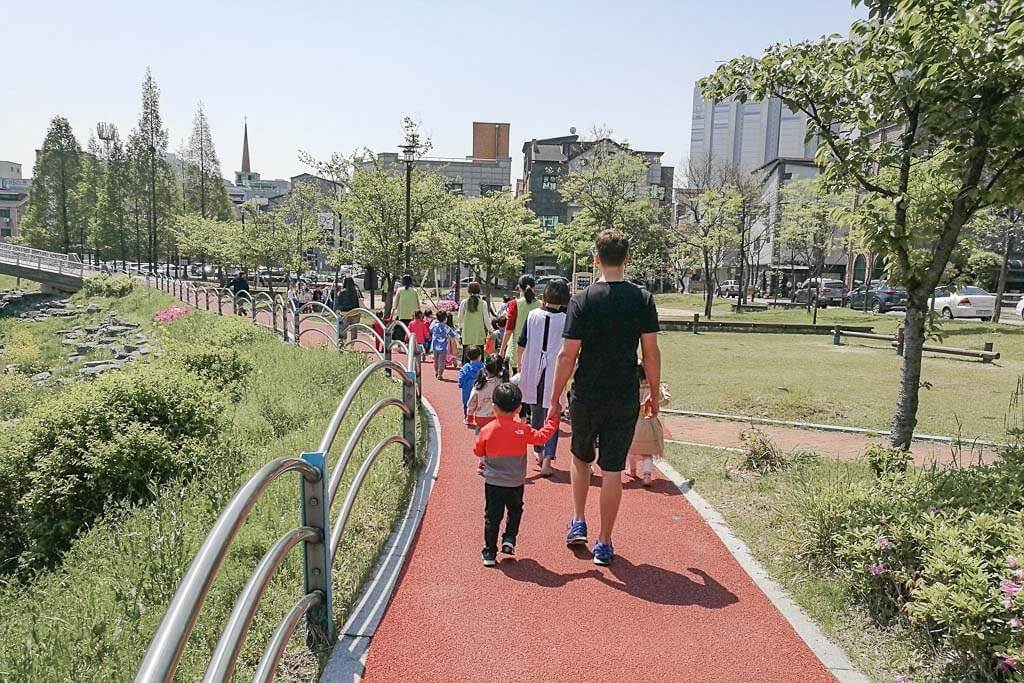
Where to teach English in Korea
Bear with me, we’re nearly at the end!
Where you teach in Korea will also affect your experience.
Teaching in Big Cities in Korea
Many English teachers in Korea prefer life in the bigger cities. This is because the Koreans residing here speak English and are used to seeing foreigners walking through the streets.
These cities have a variety of western food options and creature comforts that you may miss from back home.
However, these areas tend to have a higher cost of living.
I’ve spoken to many people who spend double the amount of money I do on amenities, entertainment, and eating out.
This is because you’re spoilt for choice in the larger cities. There’s always something happening, people to meet, and an excuse to spend your hard-earned cash.
Seoul is the capital and the most foreigner-friendly city in the country. Hence it’s a popular choice for English teachers in South Korea.
Busan is the second-largest city located along the coast and is also a crowd favorite due to the beaches and relaxed atmosphere.
More inland are Daejeon and Daegu also offering a big city environment.
Teaching in Rural Areas of Korea
When Koreans speak of rural cities, they are not referring to small farming towns with little infrastructure.
These rural areas are still well-developed towns or cities with good transportation systems, shopping malls, and schools.
They’re just smaller cities that aren’t necessarily as foreigner-friendly as the likes of Seoul and Busan.
Communication may be an issue, and you will struggle to find a wide variety of westernized restaurants.
In contrast to the cosmopolitan city of Seoul, the smaller, rural areas run at a slower pace.
You could go for days without seeing a foreigner in your town!
Whilst you will save more money in these smaller towns, it can get lonely and boring. However, this allows you to really entrench yourself in the Korean culture and their way of life.
It also forces you to get out of your comfort zone and make an effort to meet people in your city.

So, where should you look at teaching in Korea
My recommendation: If you’re traveling alone and you want to meet lots of people and have the convenience of Westernized luxuries, choose a bigger city.
If you only plan on staying in Korea for 1 year, then Seoul is also a good choice. This is because there are so many awesome day trips to take from Seoul, and the transportation network to all other cities is best from Seoul.
However, if your goal is to save money in Korea, and you’re independent (and ok will not meeting tons of foreigners), choose a smaller town.
I’d recommend living close to Seoul or Busan so that you can still pop over for weekends and take part in weekend activities, yet also distance yourself from the busyness of living in such a fast-paced, expensive city.
How much will it cost to get to Korea
As an English teacher, your flight to Korea is covered by your new school.
My school purchased this flight for me but have heard of some cases where teachers are expected to buy their flight, and the school will reimburse them after their arrival.
The school will also take care of all visa sponsorship costs.
Upon arrival, you will need to have a medical check which costs around $100. This is also covered by your school. (You may want to confirm this as some teachers are required to pay for the medical themselves).
So what do you pay for? Below are rough estimates.
- Courier your contract and other documents to Korea: $55
- Police clearance: $12
- Passport photos and other miscellaneous items: $20
- Money to get you by for your first month in Korea (as you’ll only be paid at the end of the month): $550
- TEFL course: $35
So that’s it! Teaching in Korea really is as good as it seems, and if you manage your finances properly, you can save a lot of money.

Monthly expenses as an English teacher in Korea
My goal of moving to Korea to teach English was to save money. Here are my expenses.
I live in a 1 bedroom apartment with my boyfriend (that’s provided by my school), and we split all costs.
These expenses below don’t include additional spending such as clothing, vacations, tours, and other luxuries.
My monthly expenses include:
Housing expenses/utilities: 53 000 KRW ($45)
The above cost for housing includes electricity (20 000 KRW), gas (10 000 KRW), internet (8 000 KRW), and maintenance (15 000 KRW).
Because I live with my boyfriend, my utility costs are slightly lower than they would be if I were living alone as we split costs.
Living expenses: 560 000 KRW ($480)
Gary and I each put 560 000 KRW ($480) into a shared account that we use to cover all household expenses, groceries, transport, eating out, and entertainment for the month.
In order to save money, we only eat out once or twice a week and stick to local food when we do.
We get by with this amount. However, the last week is always touch and go, and we may tuck into our personal accounts if we decided to visit Seoul for the night.
Your social habits can have a huge impact on how much money you spend.
Alcohol is expensive in Korea. That, coupled with Western food after a big night, could have you spending a big chunk of your salary.
Cell phone: 15 000 KRW ($13)
Free Wi-Fi is available almost everywhere in Korea.
I arrived in the country with a phone and purchased a sim card and package that allows limited phone calls and 5 gigs of data for 70 000 KRW ($14 per month).
You actually don’t even need to purchase data, but it does come in handy when there is no Wi-Fi and you’re stuck trying to find the route home.
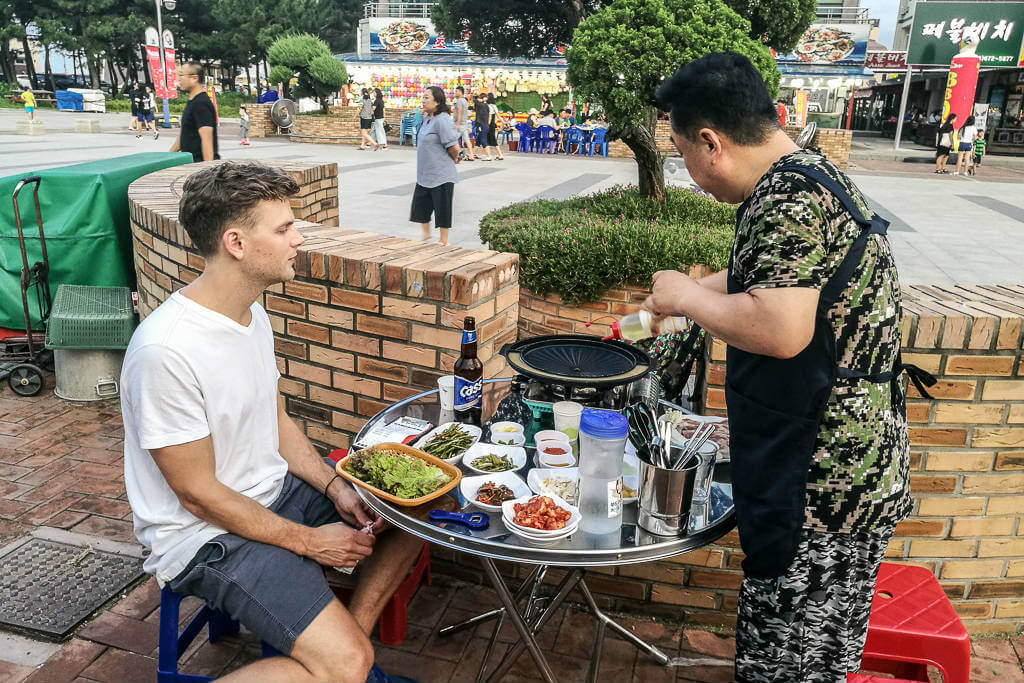
How much money do I save teaching in Korea
Here are my actual figures of what I was able to save. Each person will differ.
Total savings per month
| Salary | 2 100 000 won ($1 936) |
| – Taxes (3%) | 69 300 won ($64) |
| – Monthly expenses | 628 000 won ($580) |
| Total savings per month | 1 402 700 won ($1 293) |
Total savings after completion of a 12 month contract
| Income after 12 months | 1 402 700 won x 12 = 16 832 400 won ($15 520) |
| + Severance pay (after tax) | 2 030 700 won ($1 870) |
| Total savings | 18 863 100 won ($17 000) |
Other expenses to consider when teaching English in South Korea
Yes, that’s right.
You can save over $17 000 on an English teacher salary in Korea in just 1 year!
But remember, this doesn’t include luxuries or other expenses such as clothing, make-up, and travel.
Many people have responsibilities back home, or debt to pay off. These savings will go a long way in paying that off or helping family members who need it.
Korea has incredible beauty and fashion culture. If you love shopping, you need to account for those expenses as well.
I love to travel, and so I would dig into my savings, which I didn’t feel guilty about. I splurged on many ski trips in Korea and even flew to the Philippines during my school vacation!
I also got to see most of the country and took advantage of long weekend getaways.
With the money I saved teaching in South Korea, I was able to fly back home twice during the year due to family reasons.
With the balance, I went backpacking through Asia for 4 months, hiked to Everest Base Camp. And still had money to spare!
Oh, and did I mention that I had LASEK eye surgery in Korea? If you have bad eyes, Korea is the best place to have the operation! And, yep, you’ll be able to afford it with your English teacher salary in Korea.
Now that I’ve convinced you why you should quit your job and teach English in South Korea, here are all the details to finding that perfect job!
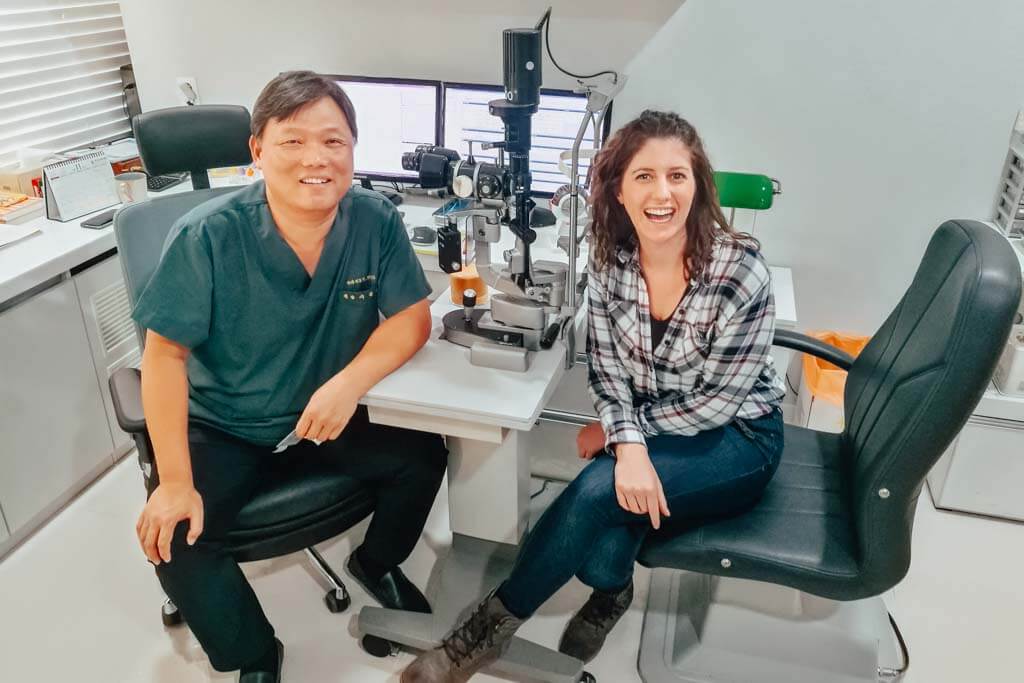
Why teach English in Korea (vs other countries)
When deciding where to teach English abroad, your reason for wanting to relocate is the most important consideration.
What do you want to get out of the experience?
Is it a long-term move?
Are you looking for a gap year filled with exciting adventures, partying, and easy teaching?
Or do you want to save money, no matter how long the hours are and intense the work is?
My reason to teach English in Korea was a compounded one: I wanted to spend 1 year abroad, experiencing a new, diverse culture.
But most importantly, I wanted to save money!
READ MORE: WHERE TO STAY IN JEJU ISLAND
How did I end up teaching in Korea
Bearing in mind that my goal was to save money, I eventually decided on relocating to the K-Pop capital, Korea.
I didn’t pursue teaching jobs in other countries for these reasons:
Thailand & Vietnam: As much as I would have loved to live in these tropical locations, the salaries for English teachers in both Thailand and Vietnam are much lower than other Asian countries. The benefits are also far less.
But, you don’t need a degree to teach English here so it’s a great option for some people.
China: China is a popular destination for English teachers. It has a huge expat community but I felt that the lifestyle would be too familiar. I was worried that I would get caught up in a foreigner crowd and not entrench myself in the local way of living.
I wanted to step out of my comfort zone completely and I didn’t feel that I would achieve this here. I have friends who’ve taught English in both Korea and China, and their feedback is similar to what I expected. However, the pay can be higher in China.
Japan: Japan offers desirable packages for those looking to teach English abroad. Despite this, the cost of living in the country is very high. This could have you spending a lot of your teaching salary on daily expenses.
Bearing this in mind, I was reluctant to move to Japan as I wasn’t quite sure how much money I’d actually be able to save. On top of this, the job market is competitive, especially for those with no prior teaching experience.

Why I eventually decided on teaching English in Korea
I knew nothing about South Korea – nothing!
Is it similar to China? Or Japan?
Actually, where is Korea?
It’s often overlooked and lies in the shadows of its bigger, more powerful neighboring countries.
Korea intrigued me as it was so foreign.
The benefits and salaries for English teachers in Korea are great, and it’s easy to get a job in the country.
It took very little convincing. I immediately decided that this is where I wanted to teach English abroad.
After living in Korea for 14 months, here’s what I love about the country.
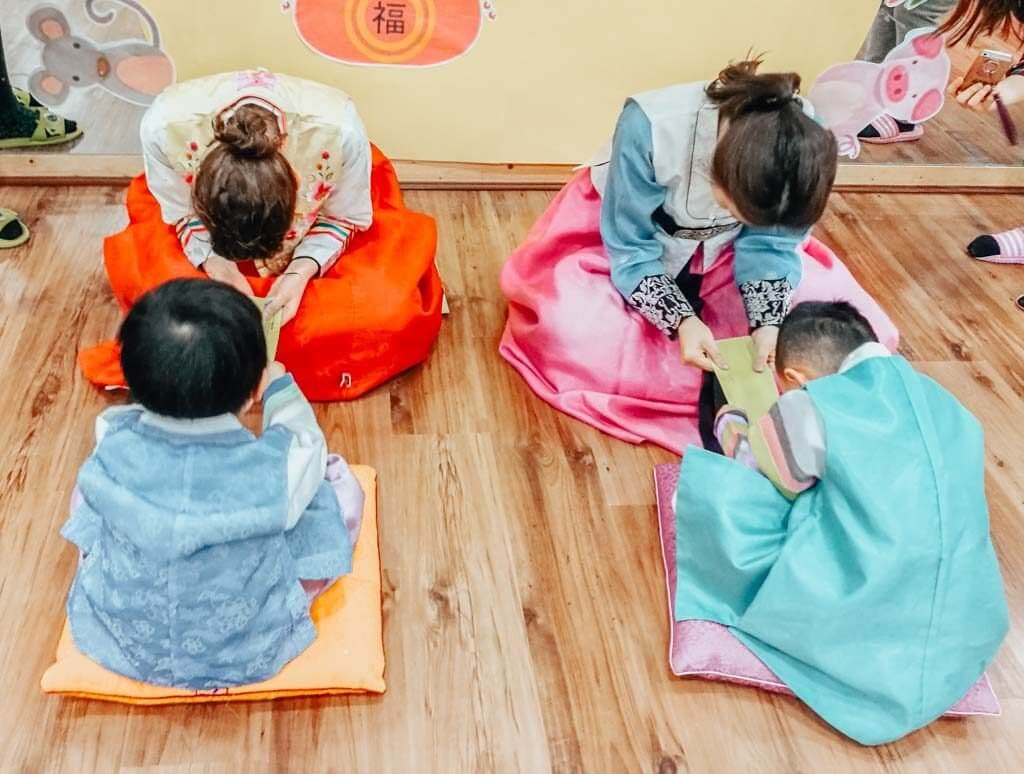
What is it really like to teach English in Korea
Teaching English in South Korea is the best decision I’ve ever made.
Yes, the hours are long. But the country is just so incredible!
Before moving here, I recommend you read these two posts that I’ve written. They will give you a good idea of what to expect. Because it isn’t all good.
I work at a Hagwon and teach at the kindergarten in the morning, and an elementary academy in the afternoon.
Personally, I prefer the kindy.
Korean kids are absolutely adorable and even though I cannot speak a word to the 5-year-olds that I teach, I thoroughly enjoy singing songs with them and chasing them around the play area.
They can be a handful, yes, especially the boys, but if you love children, then kindergarten is for you.
My afternoons include classes with elementary and middle school students.
I do enjoy these older kids as I can communicate with them and it’s at this level that you see the greatest development in their English.
Looking for more Korea travel information? Check out my other posts!
- Backpacking Korea: 29 Things You Need To Know
- 10 Things You Need To Know About Jimjilbangs in Korea
- The Best Things To Do In Jeju Island, Korea
- Perfect Nami Island Itinerary
Have you thought about being an English teacher in Korea? What’s stopping you? And if you’re a South African teaching English in Korea, did you have a similar experience to me? Let me know in the comments section below!

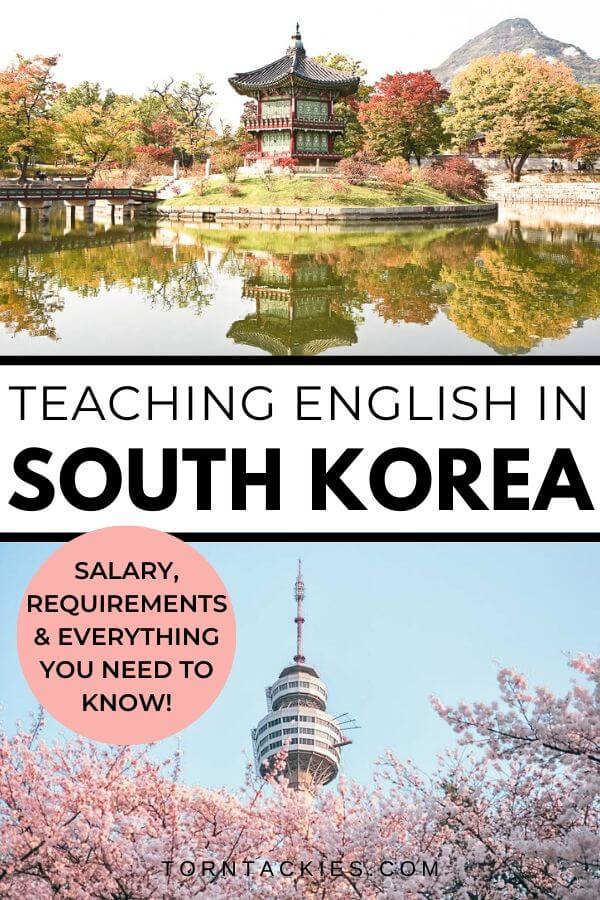

Nice post. While each has it’s ups and downs I taught in both hagwons and public schools. It’s easier for new teachers in public schools since you are an assistant, but if you like autonomy then hagwons are often better.
Hey Ian, I totally agree. There are pros and cons to both! I would have loved the extra vacation days that public schools get, but I knew I wouldn’t find a teaching position in the same city as my boyfriend if I went for a public school program.
Thank you so much for this really well written article.
I’m also a South African and once I finish my teaching degree I wanted to take a break and go teach abroad, because I know the Korean language already I think I’ll enjoy it more because I can communicate with them. This article has affirmed my attraction to Korea.
I also want to point out Korea is a good home base to travel to other countries, such as Japan, China, Bali is also right there.
Is it true that korean schools don’t allow dyed hair and fake nails (acrylics specifically)? As a girl with half of my hair bleached and not having seen my whole real nails in a hot minute, that would be something to get used to, but I keep hearing about it. Is it true?
Hi Selena. That’s something I wasn’t aware of, and it is certainly not a general rule. Some schools will be stricter than others in the interview process, and they may not employ you because of it, but that’s the exception. As long as your look presentable, you will be fine.
Hi, can you help me apply in South Korea as an English Teacher? I am from the Philippines and I am planning by 2024 to go and apply. What are the requirements?
I really like your blog.
Hi Dorothy, I’m glad you found my blog helpful. Unfortunately it doesn’t seem like you meet the requirements as you need to be a citizen from either South Africa, Canada, USA, Ireland, UK, Australia and New Zealand (English speaking country). Other requirements are that you have a Bachelor’s degree from an English speaking University/College and a clear criminal record.
Hi Carryn, I read through your blog and got interested, does it mean that even Kenyan citizens can not teach English in Korea? English is a national language in Kenya.
Rgds,
Bril
Hi Bril,
Unfortunately Korea will only give teaching visas to citizens of the selected countries. You can reach out to recruiters and see if there’s another option, but it doesn’t look too promising for Kenyan citizens (even if English is a national language).
Carryn
Hey carry what if you come from Kenya can one apply am a student from Kenya and I came across this blog.Am studying English literature will be done by next year can I be able to apply or….
Hi Jetaline,
Unfortunately, based on the information you’ve shared, you don’t meet the requirements. Even if you are an english speaker, you need to hold citizenship from either South Africa, Canada, USA, Ireland, UK, Australia, and New Zealand if you want to teach english in Korea.
Carryn
Hi Carryn. I just came across your blog while looking for jobs out of South Africa and I’m so glad I did 🙂
I recently acquired my TEFL certificate, and I have a Bachelor’s degree from UKZN and reading your blog really took away my fears of moving away from home. I currently have no teaching experience as yet, but I am applying to teach online for the time being.
My only concern is if you’re moving to teach in Korea alone, how safe is it for a female?
Hi Aalia, I’m so excited for you! South Korea is extremely safe and there’s virtually no crime. I would often walk around alone at night and never felt uneasy. I also felt comfortable using public transport, taking taxis, exploring cities all by myself. You’ll be just fine 🙂
Good luck with the job hunt. Carryn
Hello,
Really enjoyed reading your well-informed post!
Question: Is there an age requirement? I taught English many years ago. I am now retired and interested in teaching English in Busan or a nearby rural surrounding area.
Thank you so much.
Hi Suni, thanks for reaching out. No, there isn’t an age limit to teaching English in Korea. The only requirements are the below:
– Bachelor’s degree from an English speaking University/College
– Clear criminal record
– Citizenship from an English-speaking country. These countries include South Africa, Canada, USA, Ireland, UK, Australia and New Zealand
– Pass a health test which includes a drug and HIV test
If you meet these requirements, you shouldn’t have a problem finding a job.
Good luck!
Carryn
Hi,
I feel so excited after reading this article. Where can I do this TEFL certificate? Do I have to do it upon application or before I apply for work?
Hi Noluthando. You need to complete your TEFL course before you apply for a job as an English teacher in Korea. There are many TEFL courses that you can complete online, some more expensive than others. I got a great price on my course with ‘Teach Tefl’ through Daddy’s Deals. I’m not sure if this is only applicable to South Africans. Here’s the coursee I did. Remember you still need university degree in any field in addition to the TEFL course. All the best, Carryn
Hi Carryn. Thank you so much for this beautiful post. I enjoyed reading it. Please I have a question. Will I meet the criteria for teaching English if I am from an English speaking country not listed above, but have a Bachelor degree from an English speaking University?
Hi Queen,
Unfortunately, in order to qualify for the E2 visa which gives you working rights as a teacher in Korea, you need to have citizenship from one of the specified English speaking countries. This is not a decision made by the school, but rather the government who issue visas.
If you’re unsure, I recommend reaching out to a recruiter to confirm.
Carryn
Hi Carryn,
This was such a great article and I love that it’s from a fellow South African.
I wanted to hear your feedback on 2 things, if you don’t mind. Firstly, my husband and I want to teach in Korea, with the same reasons you gave in the article 🙂 however, we have a 3 year old daughter… Can it work with a child along for the journey?
Secondly, I read somewhere that the water quality is so bad, people’s hair fell out! What was your experience with that?
Hi Tara,
Thanks for your comment – so lovely to see a fellow Saffa reading my blog! Regarding your questions:
1) Because you’re married, you will most likely find a couples position at a school. Unfortunately I don’t know recruitment and visas works for teachers with children. I don’t foresee it being a problem but I’d reach out to a recruiter and see what they say. Also, join the FB group “South Africans in South Korea” and ask there. I’m sure there are many people in your same position. Something to keep in mind is that as English teachers, you’re expected to work long and hard! This is common in Korea and if you’re at a hagwon, you will only have 10 leave days. Schools may prefer to hire people with no children as they won’t be distracted with family commitments. This could make your job search a bit harder, but I’m confident you will still find something.
2) Yes, the water quality is pretty bad! I used a water filter for our shower head. This is something you can easily buy after you’ve arrived in Korea as so many people use them. Also, you will need to boil your drinking water first, or purchase bottled water.
Good luck with your job search.
Carryn
I really want to teach English in Korea I am an ESL teacher for 3 years and I want to reach my dream country I would like to be considered for this in Korea even though I am a Filipino I know I can teach English for foreigners.
Hi Jo-Anne, unfortunately it doesn’t seem that you’ll meet the requirements for the E2 visa. It’s best to reach out to a recruiter to confirm. Carryn